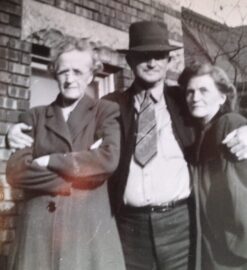Favorite Photo
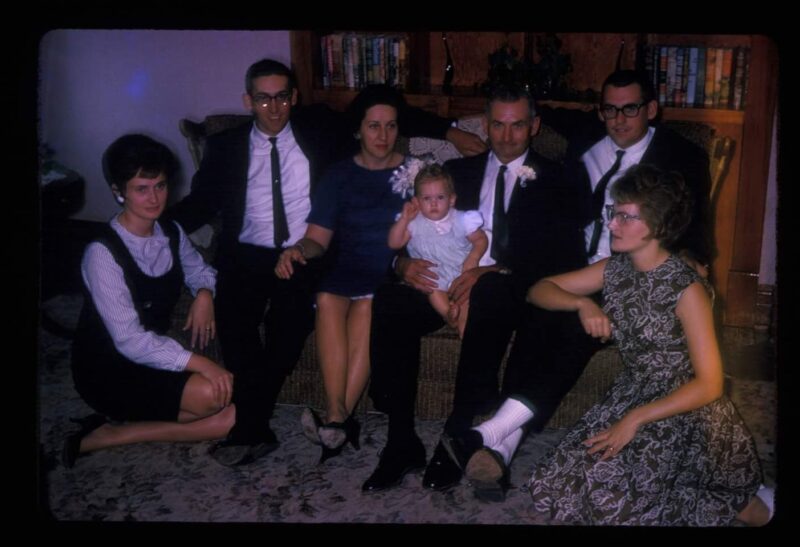
My Grandparents’ 25th Wedding Anniversary, September 1965.
I was the first child and the first grandchild. We gathered in the “North Room” of my grandparents’ home for this photo, my grandparents, my parents, my dad’s brother Tom and his wife, Roseann, and me. For the anniversary party, everybody dressed up, and there had been guests, and cake.
I would turn one year old in a few months.
My grandfather, George Frederick Malter, Fred, my Papa, was the finest man I’ve ever known. He was a gentleman farmer who wore coveralls in the field, but never went to town without a hat and a clean shirt. He was kind, a man of his word for whom a handshake carried the weight of a written contract. He spent long days in the fields, but also served on the Board of Trustees at the local bank. He was frugal and invested wisely, tall, strong, and proudly German. (His father still spoke the language to relatives in Hermann, Missouri.) My grandfather was always smiling. In my earliest memory I’m riding on a John Deere lawnmower, sitting on my grandfather’s lap.
He had a big vegetable garden and he was deathly allergic to bees. As Thomas Jefferson said, “It’s amazing what you can accomplish if you are always doing.” My grandfather was always doing. I grew up in a small farmhouse next to my grandparents’ home, and remember cursing Papa early Saturday mornings when he was out on his big tractor grading the country road to our house at 5 AM. During the depression, he’d driven a milk truck for a nickel a day. He never missed going to the Malta Bend Methodist Church on Sunday mornings, maybe at my Grandmother’s insistence, but he didn’t sing the hymns. He occasionally drank a beer. He told us he’d always wished he’d become an architect, but he never complained about being a farmer other than the typical worries about the weather. He called me “presh,” short for precious.
My grandmother epitomized matriarchy. She never hesitated to show disapproval, but was equally effusive in her praise and love. She played bridge, studied her Bible and volunteered to raise money for the church. She had been born Catholic but converted to Methodist as a child. Devoted from a young age, the Methodist Church was closest to her home and she wanted to go to church, so she walked there, alone.
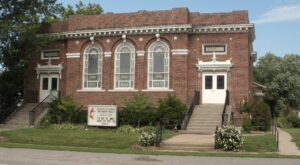
After she married and had her own family, on Sundays after church, she always cooked grand Southern lunches for her children and grandchildren, often fried chicken finished with pineapple pudding, all of us gathered around the dining table of their home, where we said grace before anyone touched his plate.
Nanny cared for me as a child while my mother finished college. She let me play dress-up in her beautiful (often hand-sewn) dresses and costume jewelry. Until her death last year at age 98, she went to the beauty shop every week and was always beautifully attired. As a girl, she loved the movies and she loved to dance. She’d grown up during the depression, the daughter of a widowed mother and sister to two brothers who went to war. When she was three years old, in 1925, her father drowned in the Missouri River after his boat overturned. Her mother cleaned houses to support the family during the Depression. My grandmother never owned a new garment until she married my grandfather, and she worried about money until the day she died. But she loved to order geegaws she found in catalogs and saw on QVC. Maybe she just liked seeing the UPS man drive down her country lane to bring her a little treasure in a box.
The family of seven in this photo grew to ten with the addition of my two cousins and my sister Leslie, the baby of the family. Nanny liked game shows (except Cash Cab!) and word search puzzles and telling off-color jokes. She loved butterflies.The sole driver among the women of her generation, she chaufferred her sister Virginia Stockman Ricks (“GeeGee”) and Papa’s cousin Catherine Rennick to get their hair done and have lunch. She never drove her big Ford Sedan outside the boundary of Saline County.
My grandparents lived in an antebellum home on the family farm, a century farm, which means it has been in the family for more than 100 years. The house sat at the end of a gravel road about a mile from the highway and three miles outside Malta Bend. Legend was that a solder had died in the hallway during the Civil War. As a child, I was terrified of the basement, but in later years fascinated by the construction of the house. The boards were held together with wooden pegs instead of nails, and those pegs had held the house up for nearly 200 years. I remember visiting them next door in the evenings where they sat on their recliners watching television. They never missed Lawrence Welk. I was welcomed with hugs and smiles and they always turned the volume down to talk with me. My grandparents travelled, Aruba and Hawaii and Las Vegas, always returning with small gifts for the grandchildren. When my father played college basketball in the 60s, they followed him all over the country to watch his games. As they grand-children grew, they attended their games too. They were doers, and goers.
I was fortunate to grow up in a small town (population 232, Salute!), surrounded by extended family. Papa and his brother farmed together, until their families expanded and they had sons to get started in the family business. My grandparents had both grown up in Malta Bend, as had their parents. Malta Bend is a footnote to the Journals of Lewis & Clark, the original home of the Missouri native American tribe, where they they passed on June 4, 1804. At one point, Malta Bend had once been a bustling small town, but during my childhood, it was just a stoplight on the highway with a small general store, the Zip Dip diner and a couple of gas stations.
Most kids stayed in Malta Bend and had kids of their own. Cousins were firsts and seconds and even thirds and beyond. My mother and I visited Esta Nye, my great-grandfather’s sister, born in 1887, the youngest daughter of German immigrants who came to the United States in 1853. Aunt Esta graduated from Warrensburg State Normal School in 1917 with a degree in history.. Her college yearbook says “She’s a shark — enuf said!” Not enough said, because I have no idea what it means. Esta’s husband Les Nye was a master craftsman who hand-made beautiful wooden furniture. Her father, Thomas Malter, was said to have been born on the ship coming over from Germany. Family lore claimed the ship’s captain had wanted to adopt him.
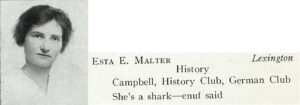
I left the farm as soon as I could. I hated being labelled a farm girl, a “hick,” and spent the next several decades trying to appear less provincial. It was an affectation, of course. You can take the girl off the farm … Looking back now, I realize I had the ideal childhood.
In 2017, we gathered for the total solar eclipse. Our century farm was just a few hundred yards from the line of total totality. We watched the sun disappear while the leaves danced in shadows. My grandmother put on her spiffy clothes and wore her special glasses and made goofy faces for the camera. She was 97 and still lived independently in the big farmhouse. It was the last time we were all together there, all of us except my grandfather who had died in 1996, rest in peace.
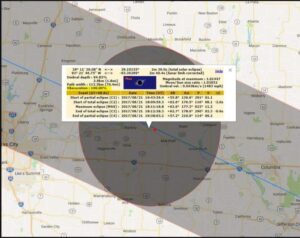
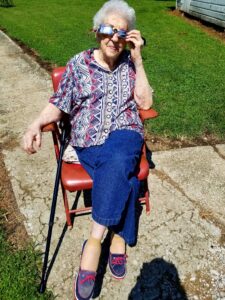
This photograph is my favorite because it, literally, represents the world to me, my family, the love, the pride, and the loss. My grandparents were younger than I am now; my parents were young enough to be my children. We had no idea what lay ahead, and we smiled with only a little reserve, because the possibilities were endless. Our future as a family was even better than anyone could have imagined. We had no tragedies or dramas, not even divorces, and my grandparents were healthy into old age. Still, there was not enough time. I’m so glad we captured this moment at the beginning of mine.

